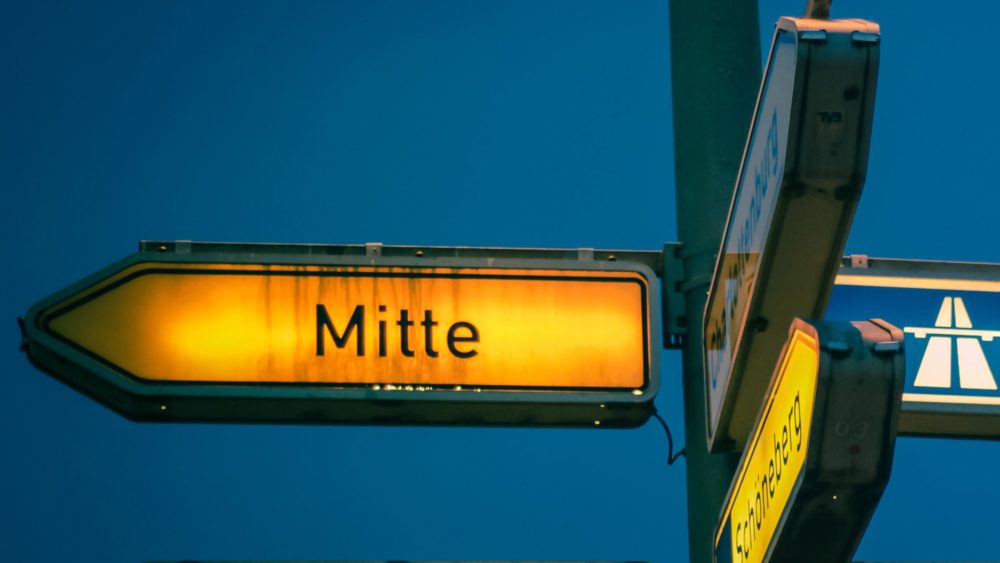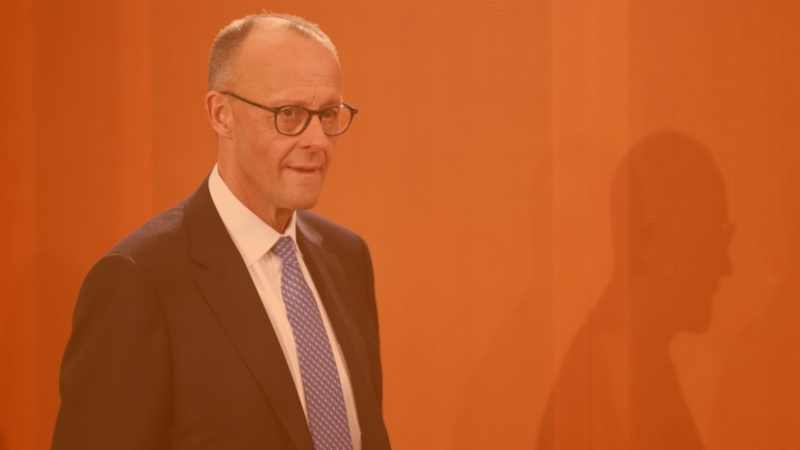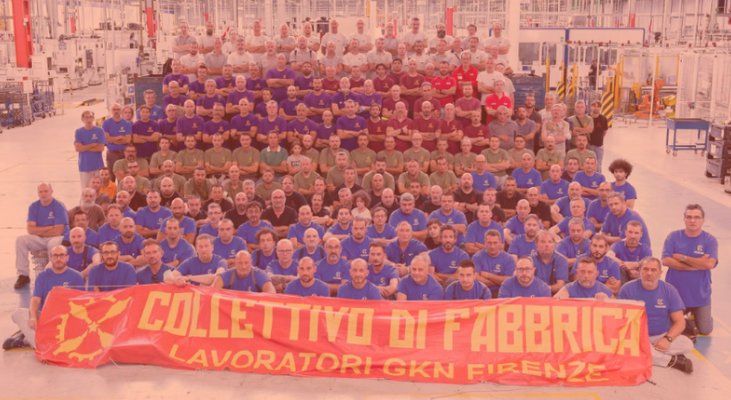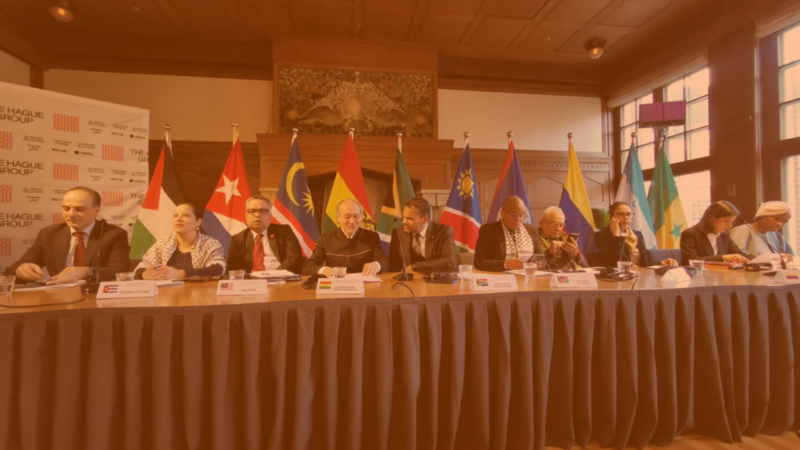Members of our movement often compare the current political situation with that of the 1930s. Yanis Varoufakis has often pointed out the parallels, regarding the historical connection to the rise of extreme right-wing parties and high unemployment throughout the eurozone.
“Society is fragmented, fascism and racism are on the rise,” he warned in May 2019 on Deutschlandfunk Nova.
In fact, exactly a hundred years ago – in 1920 – a few things happened that seem disturbingly familiar to us: on January 26, 1920, Matthias Erzberger, German Reich Minister of Finance, was assassinated by a young officer incited by right-wing hate propaganda. He barely survived.
The assassin Oltwig von Hirschfeld got away with 18 months in prison. The right-wing conservative press could hardly contain its malice. At the same time the Hohenzollern family was wrestling with the state over their property, including a rent cap (by then a party line of the SPD) which kept homeowners on tenterhooks.
All of this does not necessarily mean that history is now repeating itself “as farce”, but it is still worthwhile noting that our present is hardly as modern, post-ideological and depoliticised as some claim and that the past is anything but outdated.
After liberal politician Kemmerich, from the German liberal-centrist party FDP, was elected Prime Minister of Thurinigia on February 5, 2020, with the help of the right-wing party AfD, the establishment media rolled over with indignant contributions:
“February 5, 2020 will go down in history as the day on which the AfD helped a politician gain power in a German parliament for the first time,” says right-wing extremism researcher Matthias Quent in a newspaper interview.
Guy Verhofstadt, otherwise blessed with a thick skin when it comes to “confidence and supply” deals between members of his ALDE faction and neo-Frankist party VOX in spain, went all out on Twitter:
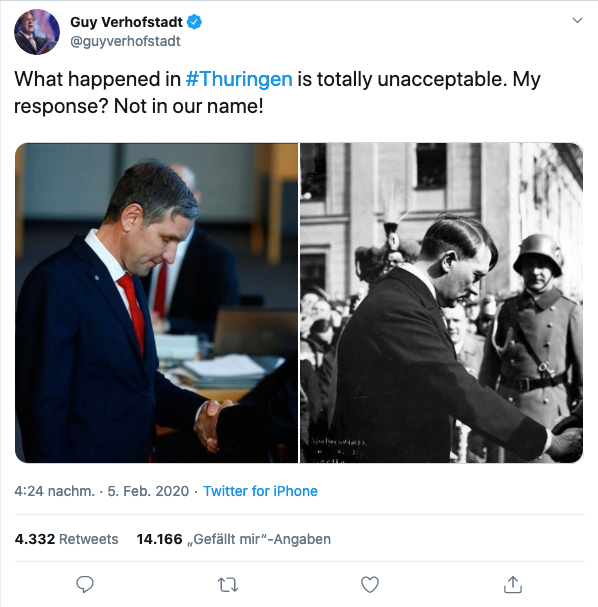
The facts in the matter are quite correct: instead of showing that a government with right-wing support is not an option, the Liberals and Conservatives of the german province Thurinigia humbly accepted it. The AfD is thus in a strategically favourable position. They show their own voters willingness to “take responsibility” and can still continue to score points with hard opposition policies.
At the national level this was accompanied with disgust from all political camps. Even stalwart conservatives like Markus Söder or Paul Ziemiak got the memo that it might be too early for such dangerous political manoeuvre.
German journalist and writer Georg Diez, however, does not want to let German liberals and conservatives get away with it that easy. On Twitter he drew the following conclusion: “the same conservative or, well, liberal publicists and politicians that are now playing the blame game, have helped prepare exactly what is happening now …”
The rise of the right can be observed throughout Europe and is linked to a growing fear of the future. The media are fanning the flames of fear. Climate change is challenging our way of life. The power of international corporations and the financial world has become excessive in our globalised economic system. And our national democracies do not appear to be up to the challenges. The fears arising from this are benefiting the right.
Liberal centrist politics has no remedies whatsoever to cope with the ideological revenants, except to raise its moral index finger and reflexively wake up when a politician is murdered, a synagogue is raided or an arsenal of weapons, collected from a fascist, is found.
However, things have to be middle-of-the-road again, quickly. After all, they are not prepared to change anything and stick to their anachronistic style of post-politics. The Left is as bad as the Right, they say, citing the famous horseshoe theory: there are only two major forces: moderates and extremists (left and right).
The neo-liberal narrative of the “end of history”, the slogan “There Is No Alternative”, the liberal centrism, they all made us forget that politics is a battlefield of interest groups and not a means to an end to impose “unpleasant, but objectively correct decisions”.
We must bury the concept of the political centre, because fewer and fewer people feel that they belong to this already vague construct. It is easy for the AfD to mock its colleagues and their “Lügenpresse” (German term for alleged state-crafted fake news) who preach endlessly about personal responsibility and civil liberties. Not only do right-wing voters suspect that there is a deep ditch in society about which nobody really wants to talk.
As Chantal Mouffe writes in her book “For a Left Populism”, we have to learn again to understand politics as a battlefield of interest groups. This does not necessarily mean that we are confronted with enemies, but with adversaries. We need this new phase of democracy, in which people don’t assume “socialist reign of terror” when politicians speak of rent caps, workers’ cooperatives, Modern Monetary Theory (MMT) or public healthcare.
We need a new democratic project, a project that offers solutions to the immense challenges of our time. It has to revitalise our democracy and work for the necessary change in parliaments, on our streets and in our living rooms. We need a positive narrative for migration, a debate about a possible world after endless growth, ideas about democracy in the workplace, a universal basic dividend – fed by the common ownership of resources – and a vision for technological sovereignty.
DiEM25 is one such project and has progressive, positive and life-affirming concepts. We open a new perspective and show that it is possible to connect the different levels.
As a movement on the streets, like on March 28 in Luxembourg against the tax avoidance of the rich and powerful. With our Electoral Wings in the parliaments, like MeRA25 in Greece and Demokratie in Europa in Germany. And as a topic of conversation in peoples’ living rooms about a new exciting project that is worth joining.
Article by Johannes Fehr (Board member of Demokratie in Europe – DiEM25) and David Schwertgen (DiEM25 Gerrmany National Collective)
Photo (C): Signs by Oliver Groß (CC-BY-NC-ND 2.0)
Do you want to be informed of DiEM25's actions? Sign up here





